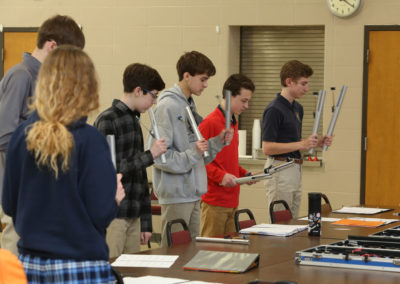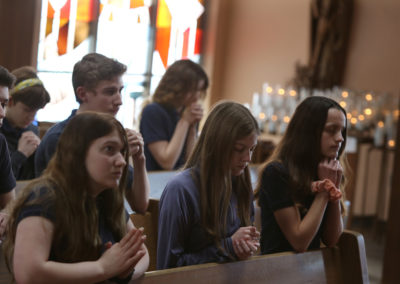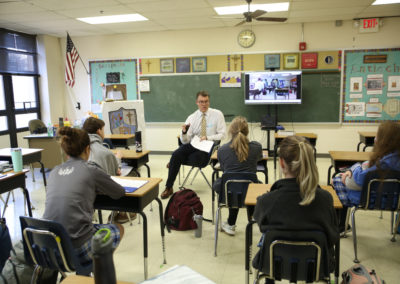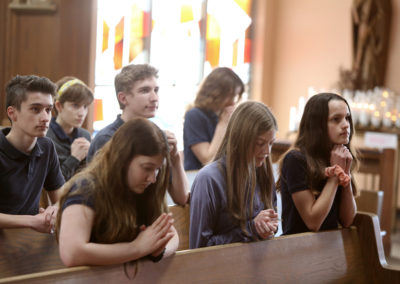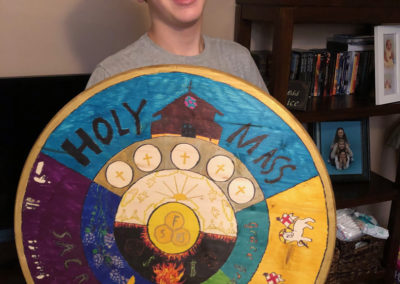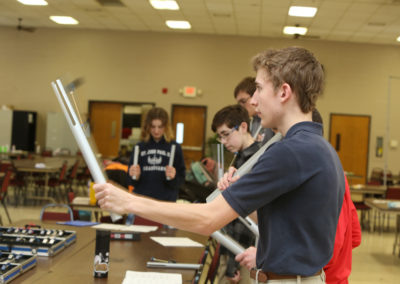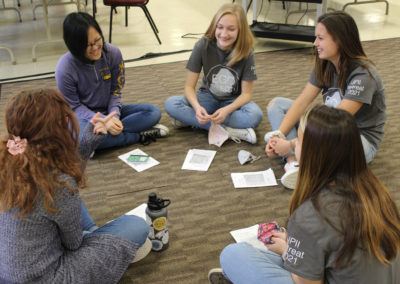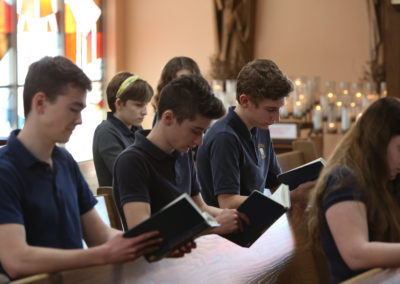High School History
American Government/History 12th Grade
Mr. John Tardiff and Mrs. Kimberly Lytle
This course presents the history of North America from the landing of Columbus in 1492 to the late 20th century. In particular, this course includes the contributions of the Catholic Church, Catholic communities, and individual Catholics – along with Catholic ideas – to the rich American story. Half of this course is comprised of the study of American government; all students must pass extensive Civics, U.S. Constitution, and Missouri Constitution tests
- Lands of Hope and Promise published by Catholic Textbook Project
- Book of Readings: Declaration Statesmanship by Richard Ferrier and Andrew Seeley, published by Key Books
History of the Modern World 11th Grade
Mrs. Angela Field
This is a college preparatory history class. The class covers European history form approximately 1450 to the present. The overarching focus of the class is on how the events of the past have helped to shape our modern world. The students will see how events that happened several hundred years ago set in motion events which led to or made possible current events. The art and culture of the time periods covered will be discussed in conjunction with the historical events which shaped them. When possible, tie ins with literature and religion classes will be made.
- A History of Europe in the Modern World published by McGraw Hill Education; workbook published by Memoria Press.
Medieval Studies 10th Grade
Dr. Richard Allington
The Middle Ages encompasses all sorts of developments which today we take for granted. Bound books, spaces between words in sentences, Romanesque and Gothic architecture, castles, chant, polyphony, religious orders, schools, waterwheels, universities, merchant banking, algebra, theology, optics, and ships that can travel on the open sea. Those ships will sail the Atlantic Ocean and around Africa opening up trade routes that will springboard Europe into becoming the most powerful region in the world.
In our class we will use a textbook Medieval Europe: A Short History, but we will also read literature and primary texts. Students will understand how the Empire collapsed and converted to Christianity, how the barbarian tribes operated and related to one another before their conversion, be introduced to the Old English Language and the Literature of the northern cultures, and glimpse the Roman Empire’s continuation in Byzantium and the rise of Islam. Additionally, students will witness the intellectual life and material culture of the Middle Ages, understand the good and the problematic aspects of the Italian Renaissance, and see how life as caricatured in The Canterbury Tales will be disrupted by war, corruption, and eventually the Reformation.
- Medieval Europe: A Short History by Charles Warren Hollister, Judith M. Bennett
- Beowulf translated by Seamus Heaney
- The Canterbury Tales by Geoffrey Chaucer
Ancient History 9th grade
Mr. Nathan Arends
The Ancient History course covers human history from the time animals were domesticated up to the creation of dioceses in the 3rd century AD. In our limited purview, we will only be able to cover a tiny sliver of this ocean of time. Our primary focus will be the Mediterranean civilizations from which spring the lions share of our culture today, and into which was born our Savior.
In this class students will learn what civilizations are made up of. How they come into existence, how a city works, how politics work, how war comes about and is executed, what drives diverse people to do things great and wicked. We will see people creating art, practicing the high ideals of religion, and investigating the world through questioning. We will strive to understand the culture into which Christ quietly came.
The majority of the course will be spent on the Histories of Greece and Rome with a month set aside for the history of Judaism, and a month set aside for history from domestication to Greece.
- Book of the Ancient Greeks, Memoria Press.
- Book of the Ancient Romans, Memoria Press.

